While Kergan Edwards-Stout‘s latest book, Songs for the New Depression, is a work of fiction, he and the book’s protagonist, Gabriel Travers, have inhabited the same worlds—enjoying the liberated world of gay sexuality and witnessing first-hand the devastation of the AIDS epidemic. “[Gabe’s] journey is entirely fictional, but when I hear his voice in my head, it sounds a lot like my partner Shane Sawick, who died in 1995,” recalls the author. “[Shane] was witty, cynical, passionate, but also had his insecurities and self-doubt. I wanted to honor him, as well as friends who died during that time, and tried to do that with this book. It’s filled with a lot of the love, laughter, and sex that seemed to be so prevalent in those years.”
“[Gabe’s] journey is entirely fictional, but when I hear his voice in my head, it sounds a lot like my partner Shane Sawick, who died in 1995,” recalls the author. “[Shane] was witty, cynical, passionate, but also had his insecurities and self-doubt. I wanted to honor him, as well as friends who died during that time, and tried to do that with this book. It’s filled with a lot of the love, laughter, and sex that seemed to be so prevalent in those years.”
In Songs, Gabriel struggles with his impending death from AIDS and looks back on two important stages in his life: his 20s, when he was wrapped up in world of mindless sex and bad decisions, and his teen years, when high-school age Gabe both found his first love and was the victim of a brutal life-altering attack. Here Edwards-Stout talks about the book, his writing style and the intersection of fact and fiction.
Before becoming a writer, you were a actor and director. What made you leave entertainment?
As much fun as all of that was, I wasn’t being fulfilled emotionally. I came to a point where I realized that I needed something more rewarding in my life, and I took a job at AIDS Project Los Angeles. I’d been a longtime volunteer, and ended up working there for four years, running an AIDS intervention program. Little did I know then how much that decision would ultimately change my life.

Is that where you met Shane?
Yes. [He] was the coordinator of the Southern California AIDS Hotline. We were together for two years before he died, and that experience of fully loving and caring for another really readjusted me. Until then, I’d been pretty self-obsessed. Without that personal awakening, of being a caregiver for another, I don’t think I would’ve been a very good parent, partner—or even a decent writer.
How about we take this to the next level?
Our newsletter is like a refreshing cocktail (or mocktail) of LGBTQ+ entertainment and pop culture, served up with a side of eye-candy.
You lead character, Gabriel, makes many mistakes on his journey. What is he hoping to accomplish?
Like so many of us, Gabriel really wants to better himself, but doesn’t know how. Growing up, he wasn’t given the tools he needed, and when you don’t feel loved, it’s easy to make mistakes in pursuit of affection. When he realizes that he is dying, however, he is forced to confront his past, in particular a horrific event that happened in his youth and shaped his future choices. Learning to love and accept himself, flaws and all, is what he attempts to do.
What made you break the book up into three distinct sections?
I felt like this story, Gabe’s discovery of himself, was really about peeling back the layers, finally revealing what is at his core and makes him act the way that he does. I like the way we first meet him, in 1995, facing death and trying to make amends. It then skips back 10 years, to when he’s in his 20s, living that hedonistic L.A. life, and we seeing him making his mistakes. Then it jumps back another 10 years, finally revealing his high school self, his more naive nature, and the moment which would inform everything that came after.
Where does the title, Songs for the New Depression, come from?
It’s the title of Bette Midler’s third album, released in 1976. Gabe is one of her biggest fans, and that album resonates thematically throughout the book.
Do you have a specific writing style?
I try to serve the story, in whatever way I think fits best. I’ve written light, funny things, as well as darker, moodier work. Songs for the New Depression walks a balance between comedy and tragedy, which is very challenging. When I was in college, I worked closely with playwright Michael Sargent, whose writing was so good, so tinged with anger, that I thought to myself “I can’t write like him—I’ll never be a writer.”
What I didn’t realize, though, is that I didn’t have to write like him to be a writer. You have to reach inside yourself and discover your own unique voice. And for me, that only came with age and life experience.
Songs for the New Depression is available now at Barnes and Noble, Amazon and fine booksellers everywhere.

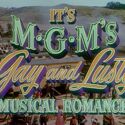
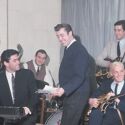


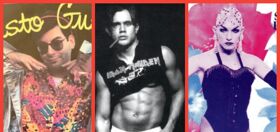





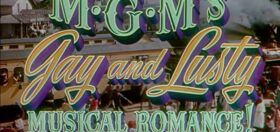
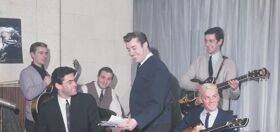






chpinnlr
I look forward to reading it!
chpinnlr
It’s not available on Kindle? Shame…I’ll keep checking for it.
Kergan Edwards-Stout
@chpinnlr: @chpinnlr – Kindle should be up in a matter of days. Each retailer uploads files at different paces. Paperback is out now at all book retailers, with hardcover and all e-Book formats in the next few days!
Thanks for your support!